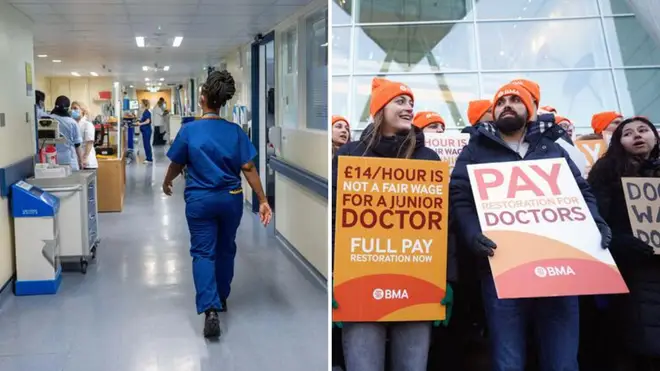
Lewis Goodall 10am - 12pm
2 January 2024, 11:33

The NHS is facing "one of the most difficult starts to the year" it has ever faced amid junior doctors' strikes and a wave of winter viruses, the service's national medical director has said.
Junior doctors are set to walk out from Wednesday at 7am until next Tuesday at 7am in a long-running pay dispute with the government. They also went on strike for three days in late December.
It comes as NHS staff are faced with pressure from more people with Covid and other seasonal viruses, as well as an expected wave of patients who delayed coming forward for treatment over the Christmas period.
Health service bosses said that staff would prioritise urgent and emergency care, with routine care to be affected by the strikes.
But people are still urged to come forward if they need treatment, rather than waiting.

Should junior doctors get back to work for winter? Ali Miraj's answer, 'they jolly well should'
NHS medical director Sir Stephen Powis said: "This January could be one of the most difficult starts to the year the NHS has ever faced.
"Six consecutive days of industrial action comes at one of our busiest periods - the action will not only have an enormous impact on planned care, but comes on top of a host of seasonal pressures such as Covid, flu, and staff absences due to sickness - all of which is impacting on how patients flow through hospitals.
"Our colleagues across the health service are doing their very best for patients every day with extensive preparations in place, but there's no doubt they are starting 2024 on the back foot - not only will action impact next week, it will continue to have a serious impact in the weeks after as we recover services and deal with additional demand."
Doctors' union the British Medical Association (BMA) say junior doctors' pay has been slashed by more than a quarter in real terms since 2008.
Junior doctors in England were given an average pay bump of 8.8%, but they said this was not enough and increased strike efforts.

Ben Kentish says the current junior doctor strikes are 'indefensible'
Labour's Darren Jones told LBC's Nick Ferrari that the government must "resolve the dispute" with junior doctors.
But he said that the Labour Party would not be able to meet doctors' demands if they were in power.
The Shadow Chief Secretary to the Treasury said: "The doctors are asking for, I think a 35% increase in pay.
"We in the Labour Party have said because of the state of the economy. If we were to inherit the books today, we wouldn't be able to afford to hit that but there is a deal to be done and negotiation should happen. But that negotiation requires people to negotiate.
"And if Conservative ministers are not willing to negotiate with doctors, then this is obviously going to rumble on and on. It's the job of ministers to get this fixed and they should fix it now."
Dr Rob Laurenson and Dr Vivek Trivedi, from the British Medical Association's (BMA) junior doctors committee, said that even "at this late hour" the government could put forward a better offer.
But the Department of Health and Social Care urged the BMA to "call off their strikes and come back to the negotiating table".
Late last year the Government and junior doctors entered talks with a view to breaking the deadlock, but after five weeks of negotiations the talks broke down and medics called more strikes.
Junior doctors from the Hospital Consultants and Specialists Association union will also join colleagues on picket lines.
Consultants and specialty and associate specialist (SAS) doctors have since agreed a deal with the Government, which is now being put to members.